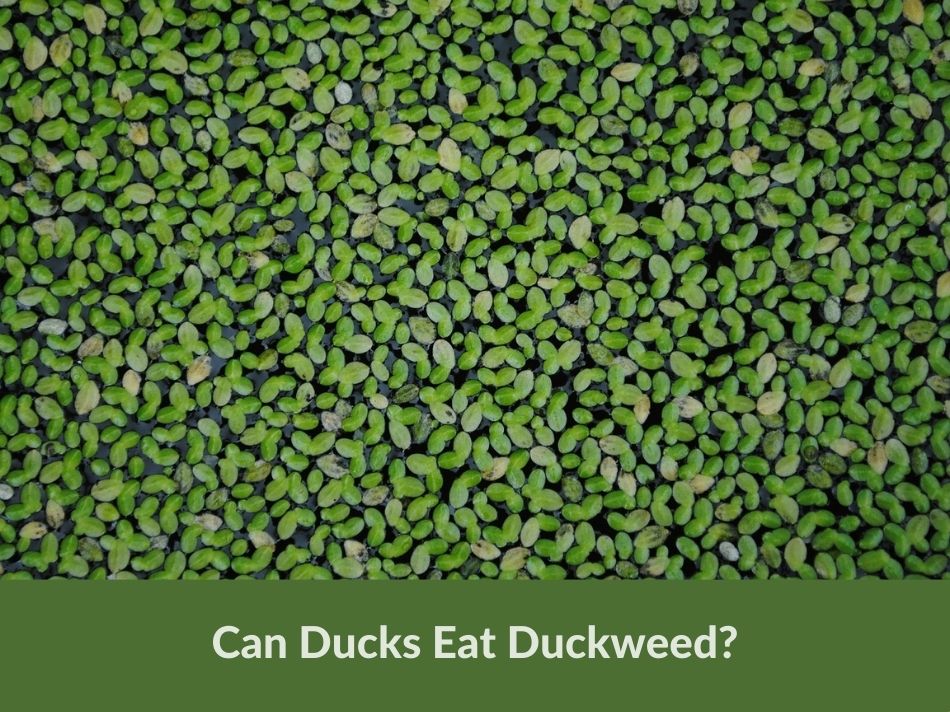Ducks are omnivorous creatures with an expansive diet that encompasses both plants and small animals. In the wild, their dietary menu includes a rich array of items such as algae, aquatic plants, insects, small fish. But, can ducks eat duckweed?
Yes, ducks can eat duckweed. It’s nutritious with a high amount of protein that can benefits the ducks health greatly. Just make sure that the duckweed is not contaminated from pollution because that can be toxic to the duck.
In this article, we delve into ducks eating duckweed. We’ll uncover the nutritional benefits of duckweed for ducks and how it fits into their natural behavior.
What is Duckweed?
Duckweed belongs to the family Lemnaceae and is one of the smallest flowering plants. They float on the water’s surface and have a simple structure: a couple of tiny leaves (or fronds) and a small root that hangs down.
While they might seem insignificant, duckweeds play a crucial role in freshwater ecosystems. They help reduce water evaporation, absorb excess nutrients, and provide shelter for small aquatic creatures.
Duckweed as a Food Source for Ducks
- Nutritional Value: Duckweed, particularly when grown under controlled conditions, is rich in protein. This makes it an excellent supplemental food source for ducks. In some settings, duckweed can provide up to 40% of a duck’s protein requirements.
- Natural Behavior: Ducks are omnivores, and in the wild, they consume a varied diet including small aquatic animals, grains, and aquatic plants like duckweed. When they forage in ponds or lakes, it’s not uncommon for them to nibble on duckweed as a part of their diet.
- Digestion: Ducks are equipped to digest a range of foods, including plant material like duckweed. Their digestive systems can extract the nutrients they need from it, making it a beneficial part of their diet.
- Quality Control: Not all duckweeds are the same. The nutritional quality of duckweed can vary based on the water source it grows in. Water with higher nutrient content can produce duckweed richer in protein. Water bodies contaminated with pollutants or toxins can result in duckweed that might be harmful to ducks.
- Balance in Diet: While ducks can eat duckweed, it shouldn’t be their only food source. Ducks require a balanced diet that includes grains, insects, and other plants to meet all their nutritional needs.
- Impact on the Ecosystem: Constant consumption of duckweed in a pond can deplete its presence, affecting other creatures dependent on it. If duckweed is a dominant feature in a pond and ducks are consuming it at a rapid rate, it might be worth introducing supplemental feed to ensure the pond’s ecosystem remains balanced.
- Potential Overgrowth: In ponds where ducks are not present or in controlled aquaculture settings, duckweed can sometimes grow unchecked, leading to overgrowth. This can be problematic as it might choke out other life forms and reduce oxygen levels in the water. Introducing ducks to such environments can actually be beneficial, as they can help control and reduce the spread of duckweed.
More Plants & Flowers Ducks Can Eat
In addition to duckweed, ducks often enjoy a variety of plants and flowers as part of their diverse diet. These delicacies not only provide essential nutrients but also allow ducks to engage in their natural foraging behavior. Some popular plants and flowers that ducks can consume include:
Before introducing any new food to your ducks, it’s essential to ensure it’s safe for consumption and free from pesticides or other harmful chemicals.
Be sure to explore our comprehensive list of plants and flowers suitable for ducks.
Conclusion
Duckweed is not just safe for ducks to eat but can be a nutritious part of their diet. However, as with any food source, moderation and balance are key. While ducks can benefit from the protein-rich duckweed, it’s important to ensure they get a balanced diet and that the consumption doesn’t negatively impact the ecosystem they’re in.
For pond owners or those keeping ducks, monitoring duckweed levels and duck health can ensure a win-win for both the ducks and the environment.
Disclaimer: The information in this article is for informational purposes only. I'm not an expert or a veterinarian.


